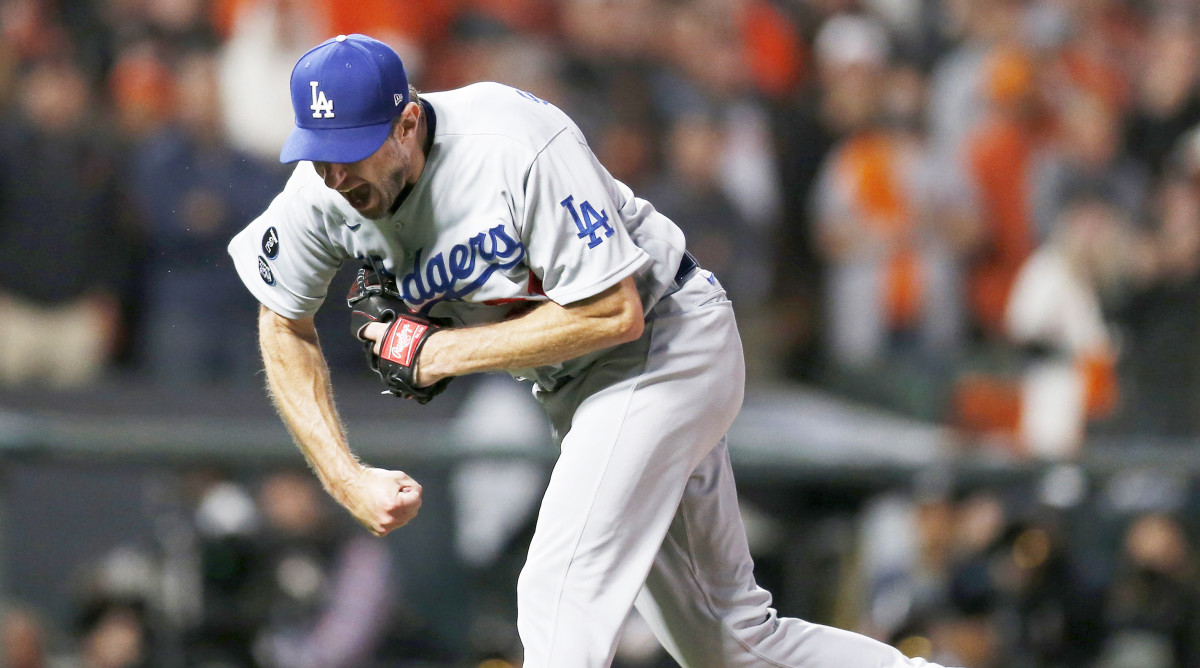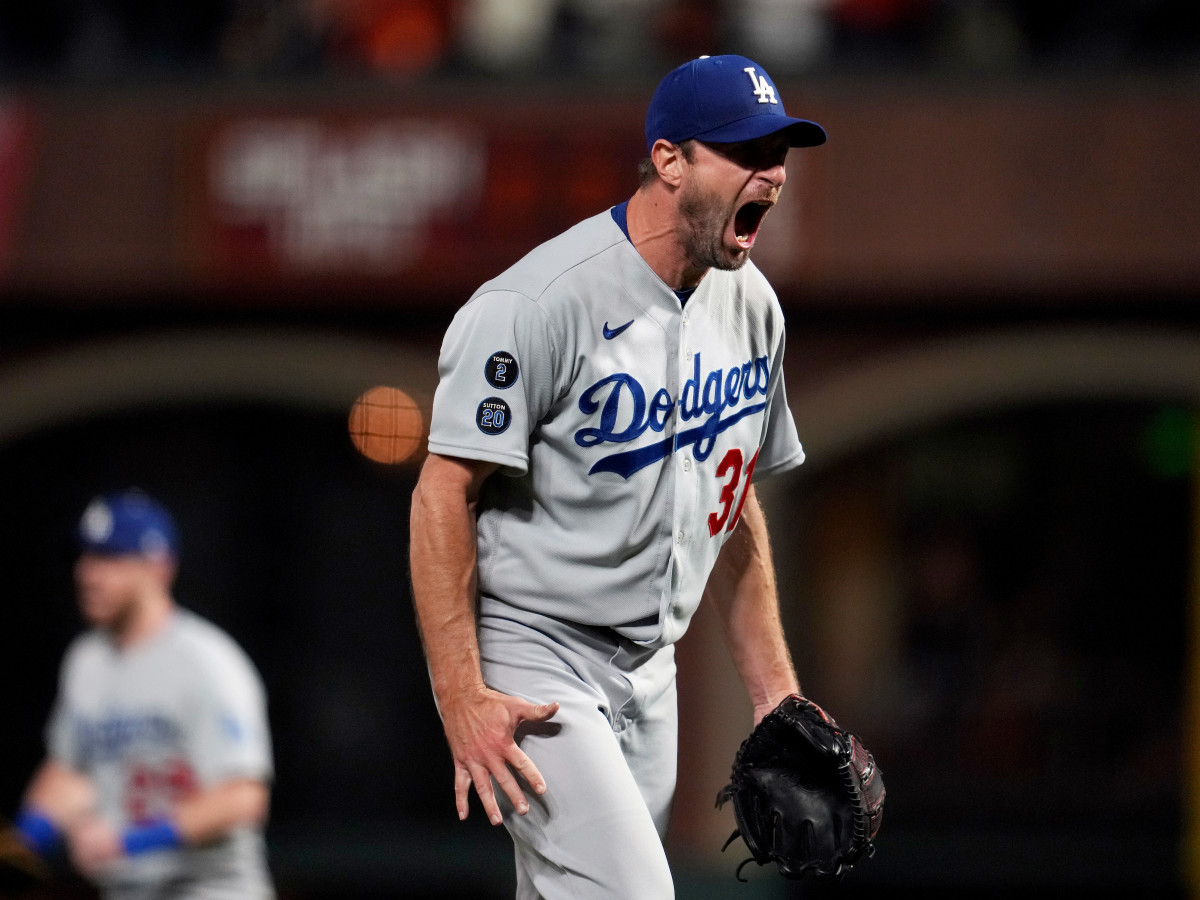Max Scherzer and the Dodgers Finally Close Things Out

SAN FRANCISCO — Three hours and 19 minutes into the best game in recent memory, a heavyweight bout in which both teams probably deserved the championship belt, a winner-take-all affair that lived up to the hype heaped upon it for the past two days, the visiting bullpen door at Oracle Park slammed open.
Dodgers first baseman Matt Beaty, who had grounded into the final out of the top of the ninth inning, knelt in the dirt, his headfirst slide barely finished. The Giants defenders jogged into their dugout. The Dodgers defenders gathered their gloves in theirs.
Max Scherzer waited for none of them. He rocketed through the outfield and onto the pitcher’s mound, a place he had spent some 500 hours, in March and April and May and June and July and August and September and October. Scherzer, 37, had thrown 2,660 major league innings, between the regular season and the playoffs, across 14 years and four teams. Only five other active pitchers have thrown more. None has entered in the ninth inning to record a save.

Until Thursday, neither had Scherzer. But Los Angeles manager Dave Roberts summoned him to preserve the Dodgers’ 2–1 lead in Game 5 of the National League Division Series against the Giants, the team they have been trying all season to run down. So Scherzer hurried.
“You gotta want to be in that situation,” he said afterward, his hair reeking from the champagne his teammates had sprayed on him after he closed out the win. “The ball was coming to me. I had to take the ball. I had to go out there with everything I got, ready to run through them. Gotta be mentally locked. Nothing was gonna stop me from winning that game. You gotta believe in yourself that you got what it takes to execute pitches in those situations, to not be overcooked. So I just wanted to get there as fast as possible.”
He had jogged to the bullpen after the top of the fourth inning, then spent the next four frames stalking around, trying to keep his legs loose. He knew his arm would be strong. He knew his brain could handle the pressure. But he was worried about those legs.
He watched as 24-year-old Logan Webb, the youngest pitcher in San Francisco history to start a winner-take-all game, mowed down the most fearsome lineup in the league, just as he had done six days earlier. Inning after inning, he baffled L.A. with a repertoire straight out of 2014—changeups to his armside, sliders to his gloveside, two-seamers in the middle. Over seven dazzling innings, he induced as many weak grounders to himself (four) as he allowed hits.
But one of those hits was a sixth-inning single by Mookie Betts, who went 4-for-4 and became the only Dodger to solve Webb. Another was a double by the next batter, Corey Seager, that scored Betts. The Giants answered with a Darin Ruf home run in the bottom of the frame, and Webb got through the seventh.
Scherzer did the math. The Dodgers had originally planned to start lefty Julio Urías but announced before the game that they would use an opener, righty Corey Knebel, instead, in an effort to force the Giants into a suboptimal lineup. Knebel pitched one inning, as did righty Brusdar Graterol. Urías got them through the sixth. Roberts brought in the reliever with the best pure stuff, righty Blake Treinen, but he did not double-switch him into the game. Treinen blew through San Francisco on 12 pitches, but his spot came up second in the batting order in the next inning, so Roberts pinch-hit for him and ended his night. In came closer Kenley Jansen, who pitched a perfect eighth.
For days Roberts had been insisting that Scherzer would be a spectator for Game 5. The ace had started the wild-card game, then thrown 110 pitches in Game 3 of the NLDS, which the Dodgers lost 1–0.
“Right now I will say he's unavailable,” Roberts said after the Dodgers won Game 4. “But I've been known to change my mind, so we'll see.”
Scherzer changed Roberts’s mind. Before the series he had offered to pitch in relief in Game 2 on short rest and then start Game 4. The Los Angeles front office dismissed that idea. But after Game 3, he skipped his normal bullpen session and his upper-body weightlifting workout. When he arrived at Oracle Park on Thursday, he played catch, then informed the coaching staff that he was “hot and ready to go,” he said.
“I don’t think our ‘A’ plan was to go to him,” said president of baseball operations Andrew Friedman. “Our ‘A’ plan was to be able to avoid him.”
They had hoped to use Jansen for six outs. But L.A. scored the go-ahead run in the top of the ninth. That rally brought the pitcher’s spot to the plate with two on and two outs, so Roberts pinch-hit Beaty.

Scherzer waited behind the bullpen door. It’s going to be deafening, he reminded himself. You won’t be able to hear or think. Use that energy to your advantage—but don’t overthrow. Stay within yourself.
He found himself unable to describe that run from the bullpen. He settled on, “Man, what a feeling,” and added, “It’d be fun to be a closer.”
The warmup was different. The stakes were different. The run in was different. But he got there and found that the mound was the same. He could fire his 96-mph four-seamer, his biting slider, his deceptive cutter.
Still, he was not happy with every pitch he threw. “I got away with a couple,” he said. “A couple of those cutters on the back side, they weren't even supposed to be there, so sometimes the baseball gods are good.”
They are Dodgers fans, if the last out was any indication. With two outs and a runner on first, Wilmer Flores strode to the plate. He took a slider in the heart of the zone for strike one. He fouled off a four-seamer. The third pitch was another slider, low and away. Replays showed that Flores did not swing at it. The Giants said they did not think Flores swung at it. Betts said that he did not think Flores swung at it. Roberts said that he “tried to sell it.”
Is it time for robot umpires in MLB? 🤔🤖 #ResilientSF pic.twitter.com/GuKawn15bq
— Sports Illustrated (@SInow) October 15, 2021
Home plate umpire Doug Eddings appealed to first base umpire Gabe Morales. Morales closed his hand into a fist. Out. He declined to say afterward whether he regretted his call.
It was a disappointing ending to a series that showcased baseball at its best. The Giants won 107 games during the regular season. The Dodgers won 106. San Francisco won 10 of their meetings. Los Angeles won nine. The teams were separated by two runs during those games. This series went the distance, and nearly went to extra innings. It had everything except Games 6 and 7.
Scherzer, who recorded his first career save, was not interested in the fairness or unfairness of the outcome. He got here at the trade deadline, when the tailspinning Nationals swapped him and shortstop Trea Turner for prospects. They have no particular attachment to Los Angeles or dislike for San Francisco. They just want to win, because winning is fun. “I knew I just needed to execute a slider down in that situation,” Scherzer said. “I got it, and just looked down to first base and saw the call that he went. That's all.”
He is not haunted by the same demons that defined Clayton Kershaw’s postseason career until the Dodgers won a championship last year. But Scherzer has hung his head a few times in October, too. Five times Scherzer has faltered in the game that bounced his team from the playoffs. Perhaps his most notable postseason relief outing came in Game 5 of the 2017 NLDS, against the Cubs, when he entered with a one-run lead, got two outs and then endured one of the more frustrating sequences of his career: single, single, double, intentional walk, strikeout but passed ball, error, catcher’s interference, hit by pitch. The Nationals lost 9–8. He called it “a gut punch.”
Sign up to get the Five-Tool Newsletter in your inbox every day during the MLB playoffs.
Two years later, he sparkled in the runup to the 2019 World Series. He allowed two runs in five innings in a Game 1 win. Then he woke up the morning of Game 5 with such a severely pinched nerve in his neck that he fell out of bed and dragged himself to his feet with his left arm. His wife, Erica, had to dress him. Three days later, buoyed by a cortisone shot, he gutted out five excruciating two-run frames in Game 7—and volunteered to go a sixth. He wept as he lifted the Commissioner’s Trophy.
The emotions were different on Thursday. The stage was smaller. Two more series still loom, beginning with the NLCS against Atlanta, if this team is to repeat. COVID-19 regulations prevented much of the revelry from 2019, although festivities of some kind certainly awaited at the team’s hotel. “I like to party,” Scherzer said. “I’m not gonna lie. I like to party. Play hard, party hard.”
But for a moment, he celebrated quietly. His toddler daughters, Brooklyn and Kacey, chased one another around the infield. Seagulls soared across the outfield. And Scherzer stood alone, champagne goggles pushed onto his forehead, on the mound.
More MLB Coverage:
• The Astros, Bruce Lee and the Importance of Adjustments
• Freeman's HR Slams Door on Brewers; Braves Back in NLCS
• Inside Kris Bryant's Journey From Chicago to San Francisco
• Boston's Small-Ball Rally Shows New Side of Red Sox
